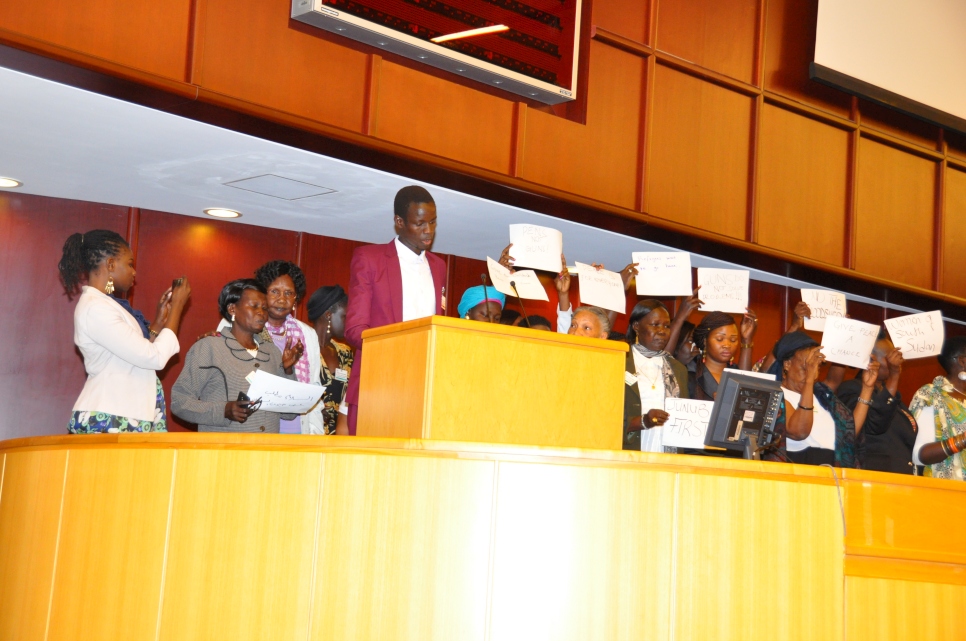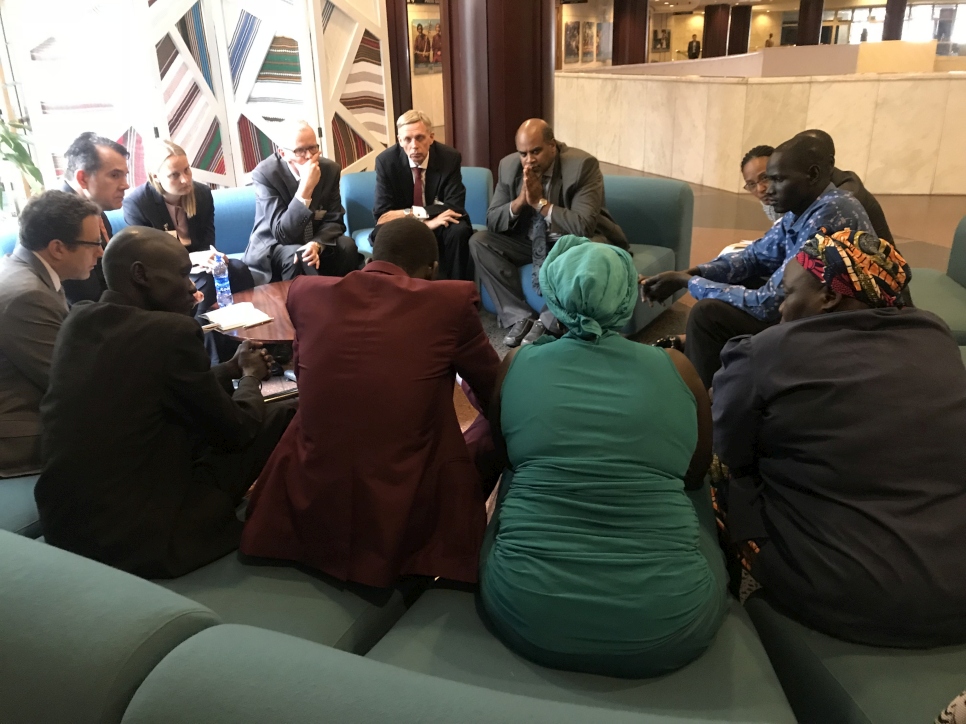Refugees say 'peace now' as South Sudan peace talks resume in Ethiopia
Representatives of South Sudan's refugees pin their hopes on ongoing peace talks in Addis Ababa, as key stakeholders seek lasting solutions to the crisis.

Refugee representatives address delegates at the High-Level Revitalization Forum in Addis Ababa, Ethiopia. They have urged leaders to bring peace to South Sudan. © UNHCR/Kisut Gebre Egziabher
ADDIS ABABA, Ethiopia - South Sudan’s opposing parties and other key stakeholders resumed peace talks last week at the UN conference centre in the Ethiopian capital of Addis Ababa.
The second round of talks of the High Level Revitalization Forum (HLRF), led by the Intergovernmental Authority on Development (IGAD), gathered delegates from South Sudan’s parties, namely the Transitional Government of National Unity, the opposition and civil society and other regional and international observers including UNHCR, the UN Refugee Agency.
The ongoing peace talks in Addis Ababa seek to revive the stalled 2015 Agreement that meant to resolve the South Sudanese conflict which continues unabated, claiming thousands of lives. After months of mediation, the forum is grappling with how to hold the spoilers of peace accountable, restore shattered trust among communities and ensure a proper transition of lasting peace.
The violent conflict that erupted in South Sudan’s capital of Juba in December 2013 has produced the fastest growing refugee crisis in Africa. Nearly 2.5 million refugees have fled to neighbouring countries while an additional 2 million are displaced inside South Sudan.
UNHCR and its partners successfully advocated for the participation of refugees in the peace talks where for the second time, nine refugees, selected from Uganda, Sudan, Ethiopia and Kenya are taking part. Invitations were also extended to refugee representatives in the Democratic Republic of Congo which hosts close to 100,000 South Sudanese refugees and the Central African Republic which hosts nearly 2,000 refugees.
“We need peace in South Sudan and we need it now, not tomorrow.”
The refugee representatives, drawn from various age groups, genders and walks of life had a clear and simple message to South Sudan’s warring parties: “We need peace in South Sudan and we need it now, not tomorrow.”
One of the representatives came to Ethiopia in 2012 to do his degree in Management and his wife and three children followed when the violent conflict exploded in December 2013.
“Men, women, boys and girls are suffering immensely as a result of the actions of our politicians”, he said.
In a collective address to the forum, the refugee representatives made an impassioned plea to the negotiating parties to think of the people in dire need of security and a place to call home.
“Leadership is not looking at yourself, it is looking at the people you lead,” they said as they urged for peace in South Sudan. “It is your responsibility.”
In their statement, the refugees reflected an optimistic tone and said “it is time to go home and think about rebuilding structures and sing the national anthem.” They underlined the imperative to give the unaccompanied minors and separated children a place to call home.
“Leadership is not looking at yourself, it is looking at the people you lead.”
Refugee Representatives formed part of the South Sudanese Civil Society delegates to the HLRF. UNHCR with the support of OXFAM facilitated a group meeting for the refugee representatives ahead of the meeting to help them strategize and discuss priority issues and advocacy points before the talks began.
“There is no military solution to the ongoing tragedy in South Sudan”, said Arnauld Akodjenou, the Regional Refugee Coordinator for the South Sudan Situation and Special Advisor to the High Commissioner for Refugees. “South Sudan’s warring groups need to sort out their differences through dialogue in order to push the peaceful transition forward.”
Akodjenou added that only 8 per cent of the US $ 1.5 billion required to support the South Sudan situation has been received to date.
“There is no military solution to the ongoing tragedy in South Sudan.”
Out of the South Sudanese refugee population in the region, 65 per cent are children, making South Sudan a children’s crisis.
“Particularly worrying is that 45 per cent of these children have not been to school in the past two years, putting the future of the world’s youngest nation at stake,” added Akodjenou.
He reiterated to those participating in the negotiations to do their best to end the suffering of South Sudanese citizens inside the country and in refugee camps in the region.

Members of the South Sudan Troika meet with representatives of South Sudanese refugees in Uganda, Kenya, Sudan and Ethiopia on the side-lines of the peace talks in Addis Ababa, Ethiopia. © UNHCR/Kisut Gebre Egziabher
In December 2017, IGAD launched the High-Level Revitalization Forum (HLRF) aimed at kick starting the 2015 Peace Agreement. The first round of the HLRF, convened from 18 to 21 December, resulted in the signing of the Agreement on Cessation of Hostilities, Protection of Civilians and Humanitarian Access.
The next round of talks was held from 5 to 16 February 2018, with a focus on governance and permanent security arrangements. Some progress was made but the parties failed to agree on a number of contentious issues, resulting in the resumption of the Addis Ababa talks.
For Jane*, a refugee representative from Kenya, the reason the peace talks have not succeeded is because they did not start by defining the root causes of the problem. “If we don’t define and address the root causes then we are fixing something that is going to break soon,” she said, adding that it is important that the negotiating parties focus on the human element of the conflict and not just on governance and security. She also appealed for the international community to support Kenyan host communities.
There was a call for the peace agreements to include mechanisms to address issues such as tribalism, hatred and hard feelings, created as a result of the conflict. “If I was wronged by a certain individual, when I go back home will I still have that tribal aspect or anger or hatred in my mind?” Jane posed to the delegates. She emphasized the important of peace being not just about power, but about security and the basic person, otherwise peace would only exist on paper.
“We are better off if we work together, otherwise no genuine peace can be achieved.”
Peter* a representative from Uganda appealed to the negotiating parties to put aside their personal differences and work together for the good of the suffering South Sudanese people. “We are better off if we work together, otherwise no genuine peace can be achieved.”
Uganda is hosting the largest number of South Sudanese refugees; a responsibility that has stretched its resources to breaking point.
He also called on the international community to maintain their support until a genuine peace is brokered. “If peace is not going to be attained in Addis Ababa, please invest in the South Sudanese people and in the refugees in neighbouring countries so that they can come forward and say what they want in one voice.”
They also urged the negotiating parties to join efforts towards genuine peace in South Sudan. “The imperative to address tribalism and leadership deficit are the major problems destroying South Sudan,” they added. “We need to address these issues to be able to bring lasting peace to South Sudan.”
* Names changed for protection reasons
